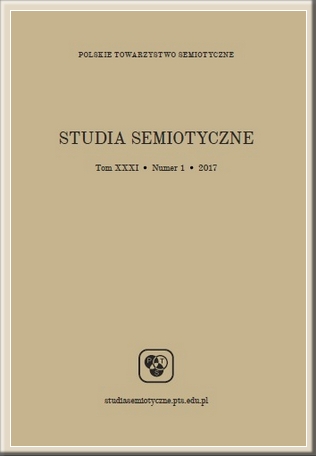Abstrakt
DOI: http://doi.org/10.26333/sts.xxxi1.07
W ramach semantyk Kripkego dla języków modalnych wartość logiczna zdania może zmieniać się wraz ze zmianą parametru indeksu semantycznego (np. świata, czasu czy miejsca). Oznacza to, że stosując tego typu semantykę do analizy zdań języka naturalnego, musimy wskazać indeks istotny dla analizy semantycznej. Zwykło się przyjmować, że odpowiedni indeks jest ustalany przez kontekst wypowiedzi. Pomysł ten został odrzucony przez semantyków analizujących języki temporalno-modalne w kontekście indeterminizmu, co wygenerowało problem ustalania indeksu. W artykule przedstawię argument owych semantyków, a następnie zarysuję kilka odpowiedzi na problem ustalania indeksu. Ostatecznie będę argumentował, że przy pewnych założeniach metafizycznych i semantycznych można udzielić klasycznej odpowiedzi na problem ustalania indeksu również w kontekstach indeterministycznych.
Bibliografia
Adams, R. M. (1974), Theories of Actuality, „Noûs” 8(3), s. 211–231
Belnap, N. (2002), Double Time References: Speech-Act Reports as Modalities in an Indeterminist Setting, w: D. Wolter, H. Wansing, M. de Rijke, M. Zakharyaschev (eds.), Advances in Modal Logic, vol. 3, Singapore: World Scientific, s. 37–58
Belnap, N., Perlo, M., Xu, M. (2001), Facing the Future: Agents and Choices in Our Indeterministic World, New York: Oxford University Press.
van Fraassen, B.C. (1966), Singular Terms, Truth-Value Gaps, and Free Logic, „Journal of Philosophy” 63(17), s. 481–495
Kaplan, D. (1989), Afterthoughts, w: J. Almong, J. Perry, H. Wettstein (ed.), Themes from Kaplan, New York: Oxford University Press, s. 565–614
King, J.C. (2003), Tense, Modality, and Semantic Values, „Philosophical Perspectives” 17(1), s. 195–246
Kotarbiński, T. (1913), Zagadnienie istnienia przyszłości, „Przegląd Filozoficzny” 16(1), s. 74–92
Kripke, S. (1980), Naming and Necessity, Cambridge, Mass.: Harvard University Press
Leśniewski, S. (1913), Czy prawda jest tylko wieczna czy też odwieczna, „Nowe Tory” 10, s. 493–528
Lewis, D. (1970), Anselm and Actuality, „Noûs”, 4(2), s. 175–188
Lewis, D. (1986), On the Plurality of Worlds, Oxford: Blackwell Publishers
Łukasiewicz, J. (1957), Aristotle’s Syllogistic from the Standpoint of Modern Formal Logic, Oxford: Oxford University Press, 2nd edition
Łukasiewicz, J. (1961), O determinizmie, w: tenże, Z zagadnień logiki i filozofii, red. J. Słupecki, Warszawa: PWN, s. 114–126
MacFarlane, J. (2003), Future Contingents and Relative Truth, „The Philosophical Quarterly” 53(212), s. 321–336
MacFarlane, J. (2008), Truth in the Garden of Forking Paths, w: M. García-Carpintero, M. Kölbel (ed.), Relative Truth, Oxford: Oxford University Press, s. 81–102
MacFarlane, J. (2014), Assessment Sensitivity: Relative Truth and Its Applications, Oxford: Clarendon Press
Plantinga, A. (1974), The Nature of Necessity, New York: Oxford University Press
Ploug, T. i Øhrstrøm, P. (2012), Branching Time, Indeterminism and Tense Logic, „Synthese” 188(3), s. 367–379
Prior, A. (1966), Postulates for Tense-Logic, „American Philosophical Quarterly” 3(2), s. 153–161
Prior, A. (1967), Past, Present and Future, Oxford: Clarendon Press
Stalnaker, R. (1976), Possible Worlds, „Noûs” 10, s. 65–75
Thomason, R. H. (1970), Indeterminist Time and Truth-Value Gaps, „Theoria” 36, s. 264–281
Thomason, R. H. (1984), Combinations of Tense and Modality, w: D. Gabbay i F. Guenthner (ed.), Handbook of Philosophical Logic, vol. 2. Dordrecht: D. Reidel Publishing Company
Twardowski, K. (1900), O tzw. prawdach względnych, w: Księga Pamiątkowa Uniwersytetu Lwowskiego ku uczczeniu pięćsetnej rocznicy Fundacji Jagiellońskiej, Uniwersytet Lwowski, s. 64–93
Wawer, J. (2014), The Truth about the Future, „Erkenntnis” 79, s. 365–401
Wawer, J. (2016), Branching Time and the Semantics of Future Contingents, dysertacja doktorska, Uniwersytet Jagielloński, Kraków
Woleński, J. (1990), Kotarbiński, Many-Valued Logic, and Truth, w: J. Woleński (ed.), Kotarbiński: Logic, Semantics and Ontology, Dordrecht: Kluwer Academic Publishers, s. 191–198.

